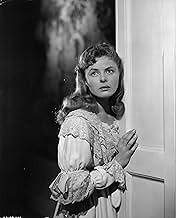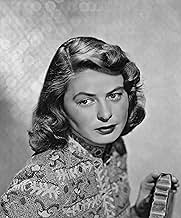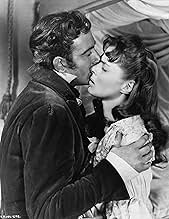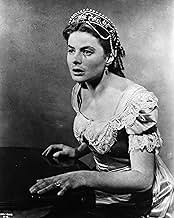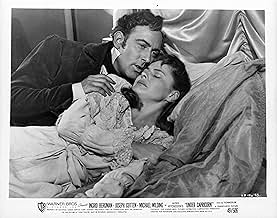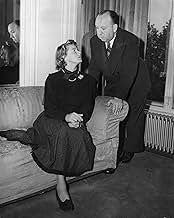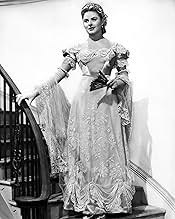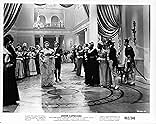A young gentleman goes to Australia where he reunites with his now married childhood sweetheart, only to find out she has become an alcoholic and harbors dark secrets.A young gentleman goes to Australia where he reunites with his now married childhood sweetheart, only to find out she has become an alcoholic and harbors dark secrets.A young gentleman goes to Australia where he reunites with his now married childhood sweetheart, only to find out she has become an alcoholic and harbors dark secrets.
- Awards
- 3 wins total
- Major Wilkins
- (as Francis de Wolff)
Featured reviews
1831: Irishman Charles Adare arrives in Australia to make his fortune, and soon hooks up with Sam Flusky, a wealthy landowner with a shady past and a business proposition. Ignoring the orders of his cousin, a local Governor, Charles continues to associate with Flusky and his alcoholic wife Henrietta, who was a friend of Charles' sister many years ago back in Ireland.
The long takes the film is composed of are often masterful. Whereas his previous film Rope felt like a gimmicky experiment (albeit a successful one), here the technique is perfected, and actually serves a purpose. It widens the scope to allow the actors room to deliver fine performances, and to exploit the lavish sets. It also serves to narrow the scope, either to focus attention or withhold crucial information until the last moment (it's especially effective at these two). This focusing/concealing also adds to the sense of Bergman's isolation and entrapment in her environment, and allows for some of the film's best shots.
I'm not a fan of Jack Cardiff, but his colour cinematography is considerably less jarring here than in his Powell-Pressburger outings, and although it does take a while to adjust the eyes, it's perfectly suited to the mood and setting.
Ingrid Bergman delivers what I consider to be her best performance. Henrietta is frail and very vulnerable - a pathetic creature. Yet the strength and dignity that she once possessed is glimpsed at the outset, and gradually comes to the fore without ever completely displacing that vulnerability.
Joseph Cotten likewise does an excellent job. His crippling inferiority complex dictates everything he does, and it's where the film gleans much of its drama. In his own way he's equally as pathetic as Henrietta; trapped in a different kind of mental prison. Sometimes he's unaware of his cruelty, believing himself to be doing the right thing; at others it's as if he can't help himself. He's a man who constantly tries to do good things, yet at every turn he's thwarted either by his own secret past, or his fear of that past. For a man so ostensibly powerful he's easy to knock down, and his reaction to these setbacks just reinforces his own negative perception of himself. This conflict is written on his every gesture and expression.
Michael Wilding's performance as Charles is less technically brilliant, but as the carefree, opportunistic cad who sees in Henrietta the chance to do an act of great kindness he's wonderful. There is great humanity in all three leads, but it's most overt and infectious in Wilding.
Charles learns that Sam is not accepted by the local society but he goes to the dinner party, where he meets Sam's wife Henrietta Flusky (Ingrid Bergman), an old acquaintance of his childhood in Ireland. Soon Charles discovers that Henrietta is alcoholic and a totally unstable woman controlled by the housekeeper Milly (Margaret Leighton), and Sam was the stable boy of her family in Ireland. They had fallen in love with each other and Henrietta elopes with Sam. However, her brother hunts them and Sam kills him and is deported to Australia. Charles stays in Sam's farm to help Henrietta and soon he falls in love with her. Meanwhile Sam is manipulated by Milly and his jealousy gets him into trouble and discloses dark secrets from his past with Henrietta.
"Under Capricorn" is a melodramatic romance by Alfred Hitchcock set in Australia in 1831, in the period of colonization of this great nation by convicts from the United Kingdom. The genre is unusual in the career of the master of suspense, but supported by magnificent cinematography and cast, highlighting Ingrid Bergman, Joseph Cotton, Michael Wilding and Margaret Leighton in a small but very important role. This film is not among my favorite Hitchcock's films and could be shorter. However, it is worthwhile watching it to see some aspects to the colonization of Australia. My vote is six.
Title (Brazil): "Sob o Signo de Capricórnio" ("Under the Capricorn Sign")
Note: On 30 October 2024, I saw this film again.
The problems start with the character of Charles Adare (Michael Wilding), a young man who comes to Australia to seek his fortune. He's the type of guy who'd make good comic relief but isn't suited to be the protagonist of a movie: a lazy, cheery, empty-headed aristocrat. Through Charles, we get introduced to some more interesting people: ex-convict Sam Flusky (Joseph Cotten) and his drunken, self-loathing wife Henrietta (Ingrid Bergman). Charles realizes that he knew Henrietta during childhood and tries to rehabilitate her, which causes long-repressed secrets and emotions to come to the surface. But since none of the characters initially engages our sympathySam is brusque, Charles is a lightweight, and Henrietta is a messit's difficult to care about any of this.
Hitchcock experimented with long takes in this movie, most notably an unbroken 8-minute- long monologue where Henrietta finally divulges her guilty secret. In one sense, this is the high point of the movie: a chance to marvel at Bergman's talent as she cycles through her emotional range without the camera ever cutting away. But in another sense, this scene displays everything that's wrong with "Under Capricorn." Henrietta's story is full of exciting passion and violence, but none of that emotion shows up during the rest of the movie. And the performers (including Bergman, Cotten, and Margaret Leighton, who plays a sinister maid) are at their best during their long monologues, not when they interact with one another.
"Under Capricorn" is not a horrible movie, just a dull one, so if you're curious about this anomaly in Hitchcock's catalog, there's no harm in spending two hours watching it. But, certainly, this movie would be forgotten today if anyone else had directed it.
The 1830s Australian setting proves very appropriate for the material, with the events unfolding in a newly-formed society with a primitive form of law enforcement, occupied by convicts and ex-convicts alike, where one's past is a dark secret of which nothing may be spoken. When an ambitious Irishman, Charles Adare (Michael Wilding), arrives in the Southern Land, the nephew of the new governor (Cecil Parker), he falls into an awkward friendship with the well-respected Sam Flusky (Joseph Cotton), an ex-convict who has made a name for himself on this new continent. Sam's wife, the beautiful Lady Henrietta Flusky (Ingrid Bergman), has suffered a mental breakdown, and, being an old childhood acquaintance, Charles considers it his duty to help this troubled woman to abandon her alcoholism and regain confidence in herself. Sprinkled about this stuffy Gothic melodrama are minor elements of suspense {most notable in the final scene featuring the scheming maid (Margaret Leighton)}, claustrophobia {as in Hitchcock's 'Rebecca (1940),' the old mansion is an character unto itself} and murder.
Though the story of 'Under Capricorn' isn't particularly interesting, and outstays its welcome by about one reel, the film is a fascinating feature from Alfred Hitchcock, and, if nothing else, exists as a testament to the director's technical ingenuity. The picture was Hitchcock's second in Technicolor, and its disastrous box-office performance led to the closure of the short-lived Transatlantic Pictures, which had been formed by himself and associate Sidney Bernstein after World War Two. The acting in the film is solid all around, without being particularly noteworthy, but the characters have enough twists to their personality to keep us watching. Long held as the forgotten black sheep of Hitchcock's output {except by the French, who apparently adored it}, 'Under Capricorn' is a worthy addition to the director's filmography, and stands as must-see viewing for all students of cinema.
Did you know
- TriviaIn 1958, Cahiers du Cinema (French Film Magazine) voted this movie as one of the ten greatest movies of all time.
- GoofsAs the characters gather for the dinner party, fairly early on in the film, the camera tracks backwards across the dining room. The table has been pushed into the path of the camera by the time it comes into view, but the candlesticks are still shaking severely from the jerking appearance of the table (their shaking lessens as the take continues).
- Quotes
[last lines]
Winter: We'll be sorry to lose you, sir.
Hon. Charles Adare: If I may say so, Winter, I'm sorry to go. Not a bad place. It is said that there is some future for it, there must be- it's a big country.
Winter: Then why are you leaving, sir?
Hon. Charles Adare: That's just it, Winter. It's not quite big enough. Bye, good luck.
- Crazy creditsOpening credits roll up over a map of Australia.
- Alternate versionsThere is an Italian edition of this film on DVD, distributed by DNA Srl: "SOTTO IL CAPRICORNO (Il peccato di Lady Considine, 1949) New Widescreen Edition + FRAGILE VIRTÙ (1927)" (2 Films on a single DVD, with "Under Capricorn" in double version 1.33:1 and 1.78:1), re-edited with the contribution of film historian Riccardo Cusin. This version is also available for streaming on some platforms.
- ConnectionsEdited into Histoire(s) du cinéma: Fatale beauté (1994)
Details
- Runtime1 hour 57 minutes
- Color
- Aspect ratio
- 1.37 : 1
Contribute to this page


